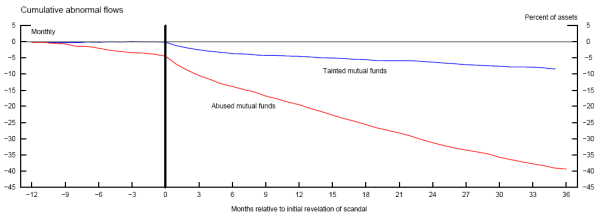More funds lower fees after scandal in 2003
Post on: 16 Март, 2015 No Comment

More funds lower fees after scandal in 2003
By John Waggoner, USA TODAY
Mutual fund fees fell in 2004, a move that industry critics say was long overdue.
Fund-tracker Lipper says 2,830 funds reduced their management fees in 2004, compared with 622 that did so in 2003.
Those fee reductions were not one-time cuts but contractual agreements with the funds’ investment advisers, which manage the funds’ assets.
The median stock fund charged investors 1.45% of assets for expenses in 2004, Lipper says, down from 1.50% in 2003. (Median means half charged more, half less.) Total expenses for sector funds declined more steeply, to 1.78% from 1.89%.
The Lipper report pointed to the mutual fund trading scandal of 2003 as one reason for the reduction. Some fund companies, such as Janus and Putnam, were charged with allowing improper trading in some of their funds. They agreed to fee reductions in settlement agreements with New York Attorney General Eliot Spitzer, who led the investigation. Other reasons for falling fees:
Breakpoints. Some funds imposed automatic fee cuts for when assets rise above certain levels, called breakpoints. Many institutional investors, such as pension funds, demand breakpoints when they negotiate deals with investment advisers. The idea: Lower fees leave more money for investors.
Robust fund flows the past two years have triggered some breakpoints. Mutual fund assets rose to $8.5 trillion in October, up from $8.1 trillion in December 2004 and $7.4 trillion in December 2003, according to the Investment Company Institute, the funds’ trade group.
Mergers. Some smaller funds with high expenses were merged into larger funds with lower expenses, says Kip Price, Lipper’s head of global fiduciary review.
Investors. Investors have poured money into big fund families untainted by the mutual fund trading scandal. Those families, such as Vanguard, Fidelity and T. Rowe Price, tend to have low expenses. Investors are voting with their feet and staying out of funds with high expenses, Price says.
Vanguard has seen an estimated $36.9 billion in new money flow into its stock and bond funds, according to Financial Research Corp. which tracks the funds. The Vanguard 500 Index fund, the company’s largest fund, charges just 0.18% of the fund’s assets for expenses.
Kunal Kapoor, director of fund analysis at Morningstar, doesn’t think lower fees are a sign of the industry’s newfound consideration for the small investor. Funds often lower fees as they grow, he says. You’ve had the stock market doing well the past three years, asset flows doing well you’d expect some expense reductions, he says.
Roy Weitz of website FundAlarm isn’t impressed with the added breakpoints: It’s like your doctor telling you he’s going to start taking your blood pressure. That’s good, but he should have been taking it all along.














